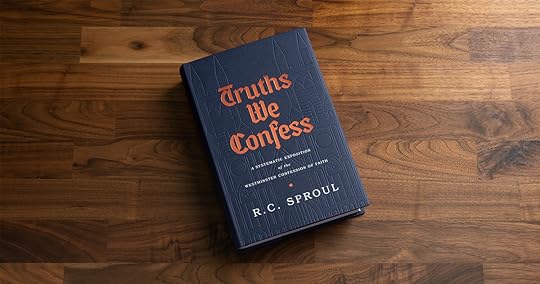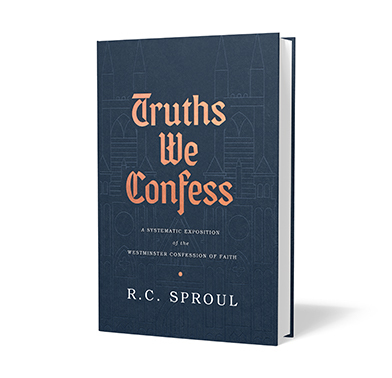R.C. Sproul's Blog, page 121
October 4, 2019
Am I Alone Wise?
How can it be that centuries of popes and church councils got the gospel wrong? In this brief clip, W. Robert Godfrey examines the question that haunted Martin Luther throughout the Reformation.
This Reformation Month, watch a short video every day on the history and insights of the Protestant Reformation. And don't forget that for this month only, you can request your free digital download of R.C. Sproul’s video teaching series Luther and the Reformation plus the ebook edition of The Legacy of Luther, edited by R.C. Sproul and Stephen Nichols at ligm.in/Reformation. Offer ends October 31, 2019.
Transcript
Luther was really haunted by the question that never occurs to a modern American, and the question was this: Am I alone wise? Am I alone wise?—Because the leaders of the church were saying to him you aren’t only taking your own soul to hell, but you're taking the souls of all those followers, who are already identified with you to hell. Are you really the only one who’s wise? All the medieval councils, all the medieval popes, all the medieval bishops, all the medieval theologians are wrong, and you alone are wise? And what he concluded was: I am not acting because think I’m wise. I am acting because the word of God forces me to do it. The word of God drives me to teach what I'm teaching. I’m not teaching what Luther thinks, I’m teaching what the Bible says. I can’t do anything else.


How Can We Encourage Our Leaders in the Church?

Elders and deacons need encouragement, too. From one of our Ask Ligonier events, Burk Parsons sets forth several practical ways we can actively support and pray for our leaders in the church.
To get real-time answers to your biblical and theological questions, just Ask.Ligonier.org.
Read the Transcript


The History of the Reformation

"A cesspool of heresies.” This was the judgment rendered by Holy Roman Emperor Charles V on May 26, 1521, shortly after Martin Luther took a stand at the Diet of Worms.
Earlier, in the bull Exsurge Domine, Pope Leo X described Luther as a wild boar loose in the vineyard of Christ and as a stiff-necked, notorious, damned heretic. On May 4, 1521, Luther was “kidnapped” by friends and whisked off to Wartburg castle, where he was kept secretly hidden, disguised as a knight. There Luther immediately undertook the task of translating the Bible into the vernacular.
Frequently the Reformation is described as a movement that revolved around two pivotal issues. The so-called “material” cause was the debate over sola fide (“justification by faith alone”). The “formal” cause was the issue of sola Scriptura, that the Bible and the Bible alone has the authority to bind the conscience of the believer. Church tradition was regarded with respect by the Reformers but not as a normative source of revelation. The “protest” of Protestantism went far beyond the issue of justification by faith alone, challenging many dogmas that emerged in Rome, especially during the Middle Ages.
In a short time, the Reformation swept through Germany but did not stop there. Aided by the translation of the Bible in other nations, the reform spread to the Huguenots in France, to Scotland, England, Switzerland, Hungary, and Holland. Ulrich Zwingli led the Reformation movement in Switzerland, John Knox in Scotland, and John Calvin among the French Protestants.
In 1534 Calvin delivered a speech calling the church to return to the pure Gospel of the New Testament. His speech was burned, and Calvin fled Paris to Geneva. Disguised as a vinedresser, he escaped the city in a basket. During the next year, some two dozen Protestants were burned alive in France. This provoked Calvin to write his famous Institutes of the Christian Religion, which was addressed to the King of France. His thought contained in the Institutes developed into the dominant theology for the international expansion of the Reformation.
The first edition of the Institutes was completed in 1536, the same year Calvin was persuaded by Farel to come to Switzerland to build Geneva into a model city of Reformation. In 1538 Farel and Calvin were forced to leave Geneva. He lived and ministered in Strasbourg for three years until he was recalled to Geneva in 1541.
Calvin’s theology stressed the sovereignty of God in all of life. His chief passion was the reform of worship to a level of purity that would give no hint to or support of the human penchant for idolatry. Geneva attracted leaders from all over Europe who came there to observe the model and be instructed by Calvin himself.
During this period turbulence spread to England when King Henry VIII resisted the authority of Rome. In 1534 Henry became the Supreme Head of the Anglican Church. He undertook the persecution of evangelicals, which escalated under “Bloody Mary,” causing many to flee to Geneva for refuge.
The persecutions were suspended under “Good Queen Bess,” Elizabeth I, whose stance provoked a papal bull against her in 1570. The Reformation spread rapidly to Scotland, largely under the leadership of John Knox, who served 19 months as a galley slave before he went to England and then to Geneva. In 1560 the Scottish Parliament rejected papal authority. In 1561 the Scottish Reformed “Kirk” was reorganized.
One interesting footnote to this is that the first man John Knox ordained into the ministry of the church was an obscure clergyman by the name of Robert Charles Sproul, of whom I am a direct descendant.
In the early 17th century, the Reformation spread to the new world with the arrival of the Pilgrims and colonies of Puritans who brought Reformed theology and the Geneva Bible with them.
Reformation theology dominated Protestant evangelicalism for decades but became diluted later under influences of Pietism and Finneyism.
By the end of the 20th century, Reformation theology declined dramatically in the Western world, being assaulted by 19th-century liberal theology on the one hand, and the influence of Arminian theology on the other. This was especially true in America.
In the present scene of American evangelicalism, Reformation theology is a minority report. The dominant strands of theology that reign in current evangelical circles are dispensationalism and neo-Pentecostal charismatic thought. The phenomenal spread and growth of dispensational theology in America is a fascinating chapter in church history. Having its roots in British Plymouth Brethren suppositions, dispensationalism spread rapidly in the late 19th and early 20th centuries. Fueled by the Bible School movement, prophecy conferences, and the preaching of men like D. L. Moody, dispensationalism gathered enormous popular support.
The American version of dispensationalism got a great boost by the publication of the Scofield Reference Bible. The Scofield Bible, with its study notes, served as a popular tool for the spread of dispensational theology. This theology was forged by men who had their roots predominately in Reformation thought. The themes of classical Reformed theology were modified significantly by this movement.
The Reformation Study Bible (originally published as the New Geneva Study Bible) is the first distinctively Reformed study Bible in English to appear since the Geneva Bible in the 16th century. It seeks to recover the theology of the Reformation and provide a guide for the laity to understand its historically, doctrinally, and biblically rich system. Its importance to American Christianity is enormous. It is my hope that it will help guide English-speaking evangelicals back to their Reformation roots. More importantly, it is designed to call evangelicals back to the Bible itself and to their historic confessions of biblical theology.
Beyond the borders of America, the Reformation Study Bible may be used to expand the light of the Reformation to lands where the original Reformation never reached, especially to Russia and Eastern Europe.
In our day we have seen a revival of interest in the Bible and a renewed commitment to the authority and trustworthiness of Scripture. But the Reformation was more than a doctrine about the Bible. It was sparked by a deep and serious study of the Bible. It is not enough to extol the virtue of Scripture—we must hear the teaching of Scripture afresh. It is only by a serious and earnest recovery of biblical truth that we will be able to avoid falling into a new cesspool of heresy.
This post was originally published in Tabletalk magazine.


October 3, 2019
$5 Friday: Creation, the Holy Spirit, & Apologetics

It’s time for our weekly $5 Friday sale. This week’s resources include such topics as apologetics, preaching, creation, God’s law, justification, the Holy Spirit, Jonathan Edwards, and more.
Sale runs through 12:01 a.m. — 11:59 p.m. Friday ET.
View today’s $5 Friday sale items.


When the Gospel Is At Stake
When the gospel is at stake, we must be like Martin Luther, willing to “let goods and kindred go, this mortal life also.” In this brief clip, R.C. Sproul reminds us that defending the gospel is worth the cost.
This Reformation Month, watch a short video every day on the history and insights of the Protestant Reformation. And don't forget that for this month only, you can request your free digital download of R.C. Sproul’s video teaching series Luther and the Reformation plus the ebook edition of The Legacy of Luther, edited by R.C. Sproul and Stephen Nichols at ligm.in/Reformation. Offer ends October 31, 2019.
Transcript
We should be willing to die for those truths that are absolutely essential to the Christian faith—not for every point of doctrine, not for every dispute. I mean sometimes we fight over theological issues that we should never be fighting about. But when it comes to the essential truths like the gospel, then Luther is a hero. Luther was willing to die. Luther stood against the world just as Athanasius had done centuries before him. When it is the truth of the gospel that is at stake, you have to be able to let ‘goods and kindred go, this mortal life also.'


Celebrating Twenty-Five Years of Renewing Your Mind

In 1971, Dr. R.C. Sproul established a small study center in the hills of western Pennsylvania. Christians gathered there to learn more about God and His Word. As the ministry grew, eventually relocating to Orlando, Florida, it reached a milestone on this date in 1994: Renewing Your Mind, a new, daily Bible-teaching broadcast, hit the airwaves. For the first time, millions of people would now easily have the opportunity to hear from Dr. Sproul and other trusted teachers every day.
Twenty-five years later, Renewing Your Mind is still heard on hundreds of radio stations around the world, the podcast and online editions are now downloaded or streamed over 1.5 million times every month, and there is a dedicated Spanish-language edition. Find all the ways you can listen here.
Today and tomorrow, as we give thanks to God and celebrate this milestone, we are airing the first message from Dr. Sproul that aired on that day in October, 1994. Special guests will join us in the studio, and we will even hear from some of you, our listeners.
This daily outreach of Ligonier has been listener supported for twenty-five years. As our way of saying thanks, we’re offering Dr. Sproul’s new booklet, God Is Holy, as a free gift to those who request it. Also, if you would like to make a donation to further support this outreach, you can give your gift securely here.
Today is a wonderful opportunity to listen for the first time or to introduce a friend or family member to the mind-renewing and life-transforming truths heard every day on Renewing Your Mind.
Offer available in the United States and Canada only. One resource per household.


The Divorce of Generations
Here’s an excerpt from The Divorce of Generations, Burk Parsons’ contribution to the October issue of Tabletalk:
We are in a crisis, and it is one of the greatest crises we have ever encountered. While the world has always faced this issue in one way or another, the church has only begun to acknowledge the reality of it, and it is growing. This crisis is not merely one involving anti-establishment impulses or anti-tradition feelings that we have observed, off or on, throughout history. Nor is it simply a matter of typical teenage rebellion. Rather, it is a problem that has emerged in some ways in every age bracket.
This crisis, simply put, is the divorce of generations. Younger generations have divorced themselves from older generations, and older generations have all but given up on younger generations. While I am speaking generally, this crisis is the source of numerous other troubles in various contexts—the classroom, the workplace, the home, the state, the church, and the world. For when younger generations seek to sever all ties with older generations, the very fabric of civilization begins to rip apart. When younger men and women reject and repudiate the authority of older men and women, they are walking a path to their own demise.
Continue reading The Divorce of Generations, or begin receiving Tabletalk magazine by signing up for a free 3-month trial.
For a limited time, the new TabletalkMagazine.com allows everyone to browse and read the growing library of back issues, including this month’s issue.


October 2, 2019
Has the Roman Catholic Church Changed Since the 16th Century?
The Roman Catholic Church has changed since the 16th century. But has it gotten better or worse? In this brief clip, R.C. Sproul explains that the need for reformation is far from over.
This Reformation Month, watch a short video every day on the history and insights of the Protestant Reformation. And don't forget that for this month only, you can request your free digital download of R.C. Sproul’s video teaching series Luther and the Reformation plus the ebook edition of The Legacy of Luther, edited by R.C. Sproul and Stephen Nichols at ligm.in/Reformation. Offer ends October 31, 2019.
Transcript
The Roman Catholic Church has changed since the 16th century. There's no question about it. And the differences that we had in the 16th century have changed. They're far greater now than they were in the 16th century. All the Mariological decrees have come since the Reformation. The de fide proclamation of the infallibility of the Pope came since the Protestant Reformation. Things are not getting better; they're worse. And in the recent Roman Catholic Catechism of the decade of the 90s, all of the essential issues of the 16th-century debate were reaffirmed in that catechism including the treasury of merit, purgatory, indulgences, justification through the sacraments. So when people say that the Reformation is over, they just don't know what they're talking about. It's that simple. They don't know Roman Catholic theology.


Truths We Confess: New, Single-Volume Edition from R.C. Sproul and Reformation Trust

In the face of false doctrines and distortions of the truth, Christians must be prepared to boldly confess what they believe. Order your copy of Truths We Confess today.
The Westminster Confession of Faith is one of the most precise and comprehensive statements of biblical Christianity, and it is treasured by believers around the world. Dr. R.C. Sproul has called it one of the most important confessions of faith ever penned, and it has helped generations of Christians understand and defend what they believe.
In Truths We Confess, now thoroughly revised and available in a single, accessible volume, Dr. Sproul introduces readers to this remarkable confession, explaining its insights and applying them to modern life. In his signature easy-to-understand style and with his conviction that everyone’s a theologian, he provides valuable commentary that will serve churches and individual Christians as they strive to better understand the eternal truths of Scripture. As he walks through the confession line by line, Dr. Sproul shows how the doctrines of the Bible—from creation to covenant, sin to salvation—fit together to the glory of God. This accessible volume is designed to help you deepen your knowledge of God’s Word and answer the question, What do you believe?
“...few things will do you more good or set you on a safer path than to sit now at R.C.’s feet and read through his exposition of the great doctrines of the Christian faith. I use the phrase “sit at his feet” deliberately, because you will soon realize that this is exactly what you feel you are doing. Indeed, if you ever had the privilege of hearing R.C. speak, I suspect that you, like me, will hear his voice virtually reading his own book to you.”
—Dr. Sinclair Ferguson, Ligonier Ministries Teaching Fellow
Available now from ReformationTrust.com.
Dr. R.C. Sproul was founder of Ligonier Ministries, founding pastor of Saint Andrew’s Chapel in Sanford, Fla., first president of Reformation Bible College, and executive editor of Tabletalk magazine. His daily program, Renewing Your Mind, is still broadcast daily on hundreds of radio stations around the world and can also be heard online. He was author of more than one hundred books, including The Holiness of God, Chosen by God, and Everyone’s a Theologian. He was recognized throughout the world for his articulate defense of the inerrancy of Scripture and the need for God’s people to stand with conviction upon His Word.


The Bible Readjusts Our Notions of Fairness
In this brief clip from his teaching series Discovering Deuteronomy, W. Robert Godfrey discusses how the Bible readjusts our notions of fairness.
Transcript
Now one of the things the Old Testament does is to readjust our notion of fairness, to challenge our notion of fairness, and to really press on us are we a people of the book or are we the people who invent our own religion? If you don't like parts of the Old Testament, you can cut them out, throw them away, and there are churches that will welcome you. But you'll no longer be a biblical Christian. The Bible readjusts our notion of fairness. The Bible is not saying that Moses perished everlastingly. I don't think the Bible is saying that all those generation in the wilderness, that died in the wilderness perished everlastingly, but their physical death was a statement to the people of God and to the world and to us that sin has consequences, that sin will be judged, and that the judgment is severe. And it helps us think a little bit about Jesus on the cross, doesn't it? The death of Jesus on the cross is not a game. It's not an occasion for a Hallmark card. It's not nice. It's a horrible thing that should cause us to recoil. And the judgment of God in the Old Testament helps us to see how serious the judgment of God is on His own Son on the cross, as He bears our sins. It's serious, and the Old Testament is preparing us for that, and that's why I think it is really valuable to read a book like Deuteronomy from time to time to get our notions of right and wrong and fairness readjusted.


R.C. Sproul's Blog
- R.C. Sproul's profile
- 1933 followers




